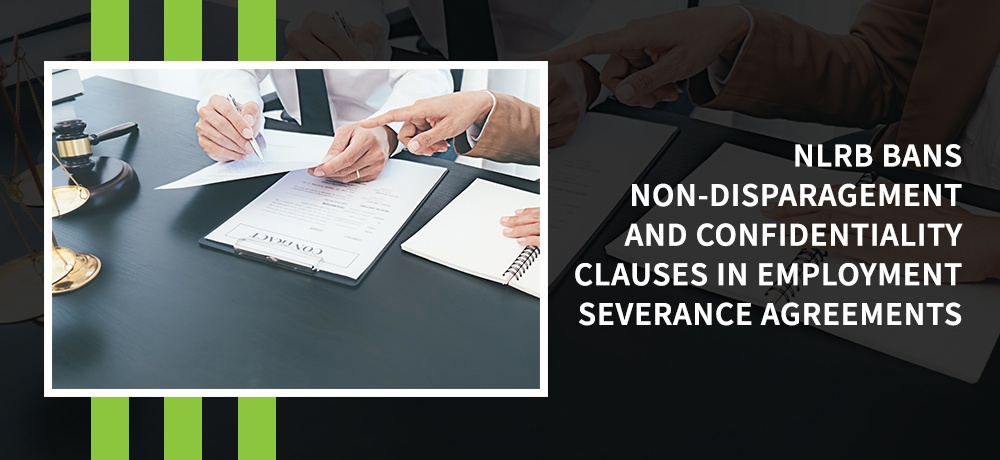NLRB Bans Non-Disparagement and Confidentiality Clauses in Employment Severance Agreements

The U.S. National Labor Relations Board (NLRB) has reversed past precedent to hold:
(1) non-disparagement clauses
(2) confidentiality clauses (concerning an agreement between company and employee)
in offered severance agreements invade federal rights of employees to confer about the terms and conditions of employment, and so are illegal under federal law, the National Labor Relations Act, Section 7 ("NLRA"), in the case of McLaren Macomb and Local 40 RN Staff Counsel, Case 07-CA-263041 (Feb. 21, 2023).
McLaren Macomb applies to employees, not managers, because employees are protected by the NLRA. It applies to businesses that meet the jurisdictional income standards for interstate commence, which depends on which industry is involved, and may not apply to very small businesses. The Act for instance is more expansive in covering health care and transportation companies, but less so non-profit cultural organizations. As a result of these clauses being illegal, a request for them to an employee protected by the Act constitutes an unfair labor practice under NLRA Section 8(a).
The McLaren Macomb decision does represent a growing trend in employment law restricting post-employment covenants upon employees. For instance in Maryland, Maryland law bans non-compete covenants for any employee making $46,800 annually or less starting in 2024 (under Maryland's minimum wage of $15 hourly) under §3–413 of the Lab. & Empl. Art., Md. Code.
In McLaren Macomb, the NLRB reasoned that because the Board depends on employees to institute Board oversight and investigation of worksites, these covenants restrict necessary Section 7 rights for employees to inform each other and confer about it, and inform the Board of problems at work. The disparagement clause found illegal stated, very broadly, "the Employee agrees not to make statement to Employer's employees or to the general public which could disparage or harm the image of the Employer." The Board notes that complaining about an unfair labor practice would "disparage" or "harm the image" of an employer, and yet it is important speech protected by federal law, under NLRA Section 7. As a result, Section 7 trumps and the provision is illegal under the NLRA.
The Board's Office of the General Counsel, in an interpretative memo, notes: "It is critical to remember that public statements by employees about the workplace are central to the exercise of employees' rights under the Act." NLRB MEMO GC-23-05 (March 22, 2023).
Board General Counsel Jennifer A. Abruzzo, Esq., advises that a defamation clause could be acceptable. Id. Defamation prevents someone from spreading known falsities or acting with reckless disregard for the truth, but permits a wide range of negative and positive speech.
Non-disparagement and confidentiality (about the agreement) covenants are standard requests during negotiations between employer and employees, so the NLRB decision should have a wide and evolving impact.
Gregg H. Mosson, Esq.
Mosson Law, LLC
ABOUT: Our founder and experienced attorney, Mr. Mosson, focuses on representing employees in claims of illegal discrimination, illegal retaliation, disability rights violations, FMLA interference, wrongful terminations, and when seeking owed wages. He also serves people seeking disability benefits from Social Security. His experience and knowledge in these areas of the law are vast and helpful to the clients he represents. For more details, visit the Web site at www.mossonlaw.com. To contact us, you can click here or call 443-226-0601.